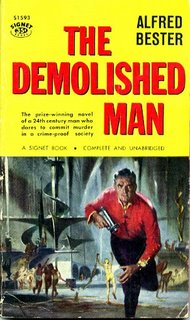#7: The Demolished Man (1953) by Alfred Bester
“Eight, sir; seven, sir; six, sir; five, sir; four, sir; three, sir; two, sir; one! Tenser, said the Tensor. Tenser, said the Tensor. Tension, apprehension, and dissension have begun.”

As you probably know, the Hugo Awards are given to (mostly) science fiction works and are doled out every year at the World Science Fiction Convention (Worldcon), which is the oldest convention of its type. The award was named after Hugo Gernsback, a pulp publisher who all but created American science fiction. Hugo Award Winners are determined by the “members” of the Worldcon, and the awards, while prestigious, are generally considered to reward the more popular works out there since the voting body is mostly made up of fans, as opposed to the Nebula Awards, which are determined by writers. The first novel ever to receive the award was Alfred Bester’s The Demolished Man in 1953.

Bester (1913-1987) is a generally beloved writer in the science fiction community. He worked in almost every facet of the genre at some point, including radio and comic books. Bester is often credited with creating the Green Lantern Oath (say it with me: “In brightest day, in blackest night…”), though he pooh-poohed the credit later in life. While he didn’t produce many novels, both The Demolished Man and The Stars My Destination (aka Tiger, Tiger) are regarded by most folks foolish enough to put together a list of the best science fiction novels as two of the greatest works in the genre. So, not surprisingly, they both make David Pringle’s list.

The Demolished Man revolves around two main characters. One is Ben Reich, a powerful corporate businessman who runs an entity known as Monarch. The other is “Dishonest Abe” Lincoln Powell, a police prefect with powerful ESP abilities. ESP is at the heart of the novel, which is set in a future society where mental abilities of this type are common in a minority of the population (known as “peepers”). Peepers are part of every influential segment of society--most importantly law and law enforcement. For instance, peeping has basically eradicated premeditated murder…until Reich comes along. Reich wants to off his main competitor, a man named D’Courtney, because he refused to merge his company with Monarch when Reich’s back was to the business wall. Reich enlists the help of several individuals to help him, including a corrupt peeper, and he uses a repetitive, advertising-like jingle (see top quote) as a mental smokescreen to protect him from mind readers. This is all fine and good until a witness appears at the murder scene. And from there, the story moves into a decidedly noire direction, but with plenty of proto-cyberpunk imagery (a psychedelic brothel born from the heat of a vicious war for instance) and Freudian symbols thrown in (Reich is chased at night in his dreams by a man with no face). Powell becomes the main investigator of the murder, and he stops at nothing to bring Reich to society’s ultimate punishment--Demolition, a mental stripping of one’s personality.

I used to love TDM. I thought it was a fascinating journey into the mind, while also a revelation about the future possibilities of ESP and non-physical perception. Years later, it's not my favorite book anymore but I'd still highly recommend it to folks. Even if ESP doesn't thrill you (I'm right there with you), Bester knows how to entertain. He also pushes pulp writing in fascinating ways throughout the novel. For instance, when peepers gather together in social situations, their conversations are, of course, far from mundane. Bester represents these conversations graphically, showing how meaning is enhanced by the physical arrangement of words (basket weaves, musical notations, mathematic curves, etc.). And beyond all that, Tenser, said the Tensor…



0 Comments:
Post a Comment
<< Home